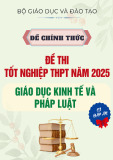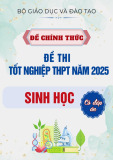
ĐỀ THI TUYỂN SINH ĐẠI HỌC, CAO ĐẲNG MINH HỌA CỦA CỤC KHẢO
THÍ
NĂM HỌC 2010-2011
(Thời gian làm bài: 90 phút)
ĐỀ 1:
Mark the letter A, B, C, or D on your answer sheet to indicate the word whose underlined
part is pronounced differently from that of the rest in each of the following questions.
Question 1:
Question 2:
Question 3:
Question 4:
Question 5:
A. shown B. flown C. grown D.
crown
A. complexion B. examination C. exaggerate D.
exhibit
A. accountant B. amount C. founding D.
country
A. missed B. laughed C. stopped D.
closed
A. criteria B. initiate C. certificate D.
interactive
Mark the letter A, B, C, or D on your answer sheet to indicate the correct answer to each
of the following questions.
Question 6: He is doing very badly but he tries to ____________appearances.
A. hold on B. stick to C. keep up D.
make out
Question 7: I regret going to the cinema. I wish I ____________.
A. didn't go there B. haven't gone there C. hadn't gone there D.
would not go there
Question 8: Today's weather will be a _______of yesterday.
A. continuing B. continuation C. continuity D.
continual
Question 9: The children had been _______ of the danger, but had taken no notice.
A. warned B. explained C. shown D.
prevented
Question 10: Our country has large areas of _______beauty.
A. unharmed B. undamaged C. unspoilt D.
uninjured
Question 11: Scientists and engineers have invented devices to remove _______from
industrial wastes.
A. pollutions B. pollute C. polluting D.
pollutants
Question 12: The _______polluted atmosphere in some industrial regions is called
"smog".
A. much B. largely C. fully D.
heavily
Question 13: Too many factories dispose _______their waste by pumping it into rivers
and the sea.

A. out B. of C. away D. off
Question 14: He was so mean that he could not bear to_ ______the smallest sum of
money for the charity appeal.
A. part with B. pay off C. give in D. let
out
Question 15: -Teacher: "Jon, you've written a much better essay this time."
- Jon: " _______"
A. Writing? Why? B. Thank you. It's really
encouraging.
C. You're welcome. D. What did you say? I'm so
shy.
Question 16: The _______north we go, the less likely we are to meet high temperatures.
A. far B. furthest C. farther D.
farthest
Question 17: Unlike the other Asian states, Singapore has ______ _ raw materials.
A. hardly any B. any hardly C. hardly no D.
hardly some
Question 18: Although the patient's condition is serious, she seems to be out of_ ______.
A. place B. control C. danger D.
order
Question 19: "ATM" stands for_.
A. automatic talking machine B. automation telling mate
C. automobile teller mate D. automated teller machine
Question 20: -"Do you feel like going to the stadium this afternoon?"
- “ ______ ______”
A. I don't agree. I'm afraid. B. I feel very bored.
C. You're welcomed. D. That would be great.
Question 21: -"I don't think I can do this."
- “ ___________”
A. Oh, come on! Give it a try! B. Yeah. It's not easy.
C. No, I hope not. D. Sure, no way!
Question 22: If you want your children to play football well, you need to find a good
_______.
A. supervisor B. teacher C. coach D.
captain
Question 23: "Don't count your chickens _______they are hatched."
A. after B. since C. while D.
before
Question 24: - Cindy: "Your hairstyle is terrific, Mary!"
- Mary:" _______".
A. Yes, all right. B. Thanks, Cindy. I had it
done yesterday.
C. Never mention it. D. Thanks, but I'm afraid.
Question 25: The sports event was _______and successfully organized.
A. good preparation B. good job C. well-done D.
well-prepared

Question 26: - "Make yourself at home."
-“___________”
A. Not at all. Don't mention it. B. Thanks. Same to you.
C. That's very nice. Thank you. D. Yes, can I help you?
Question 27: The country won't be _______for re-election as non-permanent member of
the UN Security Council.
A. suitable B. eligible C. rightful D.
legal
Question 28: Michael could hardly wait to _______his new motorbike.
A. sit down B. turn back C. try out D. put
on
Question 29: The child who was caught ______ was made to stand in the corner of the
classroom.
A. behaving B. misbehave C. misbehavior D.
misbehaving
Question 30: ______ the country joined the WTO, it has made big economic
achievements.
A. After B. Since C. When D. As
soon as
Question 31: They are conducting a wide ______ _ of surveys throughout Vietnam.
A. collection B. range C. selection D.
group
Question 32: Thanks to the invention of labor-saving _______, domestic chores are no
longer a burden.
A. devices B. things C. equipment D.
furniture
Question 33: Only 65 per cent of people voted in the local election; the rest were
completely ________.
A. uninterested B. disinterested C. uninteresting D.
interested
Question 34: Slang can be defined as a set of codes used in ______ language.
A. informal B. unfamiliar C. informative D.
uneducated
Question 35: The widespread use of pesticides and herbicides has led to the _______of
groundwater in many parts of the world.
A. corruption B. infection C. poison D.
contamination
Read the following passage and mark the letter A, B, C, or D on your answer sheet to
indicate the correct answer for each of the blanks from 36 to 45.
Many parents believe that they should begin to teach their children to read when they are
(36)_more than toddlers. This is fine if the child shows a real interest but forcing a child
could be counter-productive if she
isn't ready. Wise parents will have a (37)_attitude and take the lead from their child.
What they should provide is a selection of (38)_toys, books and other activities.
Nowadays there is plenty of good (39)_available for young children, and of course,
seeing plenty of books in use about the house will also (40)_them to read.

Of course, books are no longer the only source of stories and information. There is also a
huge range of videos, which can reinforce and extend the pleasure a child finds in a book
and are (41)_valuable in helping to increase vocabulary and concentration. Television
gets a bad review as far as children are concerned, mainly because too many spend too
much time watching programmes not intended for their age (42)_. Too many television
programmes induce an incurious, uncritical attitude that is going to make learning much
more difficult. However, (43)_ viewing of programmes designed for young children can
be useful. Just as adults enjoy reading a book after seeing it serialised on television, so
children will pounce on books which (44)_their favourite television characters, and
videos can add a new (45)_to a story known from a book.
Question 36: A. scarcely B. rarely C. slightly D. really
Question 37: A. cheerful B. contented C. relaxed D. hopeful
Question 38: A. bright B. thrilling C. energetic D. stimulating
Question 39: A. material B. sense C. produce D. amusement
Question 40: A. provoke B. encourage C. provide D. attract
Question 41: A. properly B. worthily C. perfectly D. equally
Question 42: A. set B. band C. group D. limit
Question 43: A. cautious B. choice C. approved D. discriminating
Question 44: A. illustrate B. extend C. feature D. possess
Question 45: A. revival B. dimension C. option D. existence
Read the following passage and mark the letter A, B, C, or D on your answer sheet to
indicate the correct answer to each of the questions from 46 to 55.
Herman Melville, an American author best known today for his novel Moby Dick, was
actually more popular during his lifetime for some of his other works. He traveled
extensively and used the knowledge gained during his travels as the basis for his early
novels. In 1837, at the age of eighteen, Melville signed as a cabin boy on a merchant ship
that was to sail from his Massachusetts home to Liverpool, England. His experiences on
this trip served as a basis for the novel Redburn (1849). In 1841, Melville set out on a
whaling ship headed for the South Seas. After jumping ship in Tahiti, he wandered
around the islands of Tahiti and Moorea. This South Sea island sojourn was a backdrop to
the novel Omoo (1847). After three years away from home, Melville joined up with a
U.S. naval frigate that was returning to the eastern United States around Cape Horn. The
novel White Jacket (1850) describes this lengthy voyage as a navy seaman.
With the publication of these early adventure novels, Melville developed a strong and
loyal following among readers eager for his tales of exotic places and situations.
However, in 1851, with the publication of Moby Dick, Melville's popularity started to
diminish. Moby Dick, on one level the saga of the hunt for the great white whale, was
also a heavily symbolic allegory of the heroic struggle of humanity against the universe.
The public was not ready for Melville's literary metamorphosis from romantic adventure
to philosophical symbolism. It is ironic that the novel that served to diminish Melville's
popularity during his lifetime is the one for which he is best known today.
Question 46: The main subject of the passage is ____________.
A. Melville's travels B. the popularity of Melville's novels

C. Melville's personal background D. Moby Dick
Question 47: According to the passage, Melville's early novels were ____________.
A. published while he was traveling B. completely fictional
C. all about his work on whaling ships D. based on his travel experience
Question 48: In what year did Melville's book about his experiences as a cabin boy
appear?
A. 1837 B. 1841 C. 1847 D. 1849
Question 49: The word "basis" in paragraph 1 is closest in meaning to ______
A. background B. message C. bottom D. dissertation
Question 50: The passage implies that Melville stayed in Tahiti because ______
A. he had unofficially left his ship B. he was on leave while his ship
was in port
C. he had finished his term of duty D. he had received permission to
take a vacation in Tahiti
Question 51: A "frigate" in paragraph 1 is probably_ ___________.
A. an office B. a ship C. a troop D. a fishing
boat
Question 52: How did the publication of Moby Dick affect Melville's popularity?
A. His popularity increased immediately. B. It had no effect on his popularity.
C. It caused his popularity to decrease. D. His popularity remained as strong
as ever.
Question 53: According to the passage, Moby Dick is _______.
A. a romantic adventure B. a single-faceted work
C. a short story about a whale D. symbolic of humanity fighting the
universe
Question 54: The word "metamorphosis" in paragraph 2 is closest in meaning to
____________.
A. circle B. change C. mysticism D. descent
Question 55: The passage would most likely be assigned reading in a course on
____________.
A. nineteenth-century novels B. American history
C. oceanography D. modem American literature
Read the following passage and mark the letter A, B, C, or D on your answer sheet to
indicate the correct answer to each of the questions from 56 to 65.
An air pollutant is defined as a compound added directly or indirectly by humans
to the atmosphere in such quantities as to affect humans, animals, vegetation, or materials
adversely. Air pollution requires a very flexible definition that permits continuous
change. When the first air pollution laws were established in England in the fourteenth
century, air pollutants were limited to compounds that could be seen or smelled - a far cry
from the extensive list of harmful substances known today. As technology has developed
and knowledge of the health aspects of various chemicals has increased, the list of air
pollutants has lengthened. In the future, even water vapor might be considered an air
pollutant under certain conditions.
Many of the more important air pollutants, such as sulfur oxides, carbon
monoxide, and nitrogen oxides, are found in nature. As the Earth developed, the
concentration of these pollutants was altered by various chemical reactions; they became

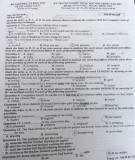
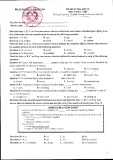
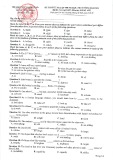
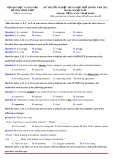
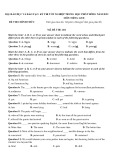
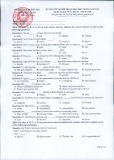
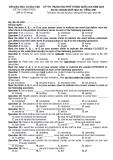
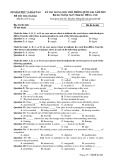
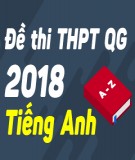
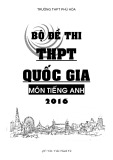







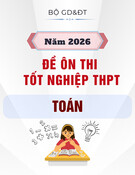

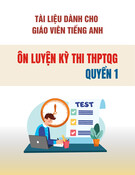
![Đề thi tiếng Anh tốt nghiệp THPT 2025 (Chính thức) kèm đáp án [mới nhất]](https://cdn.tailieu.vn/images/document/thumbnail/2025/20250627/laphong0906/135x160/9121751018473.jpg)

